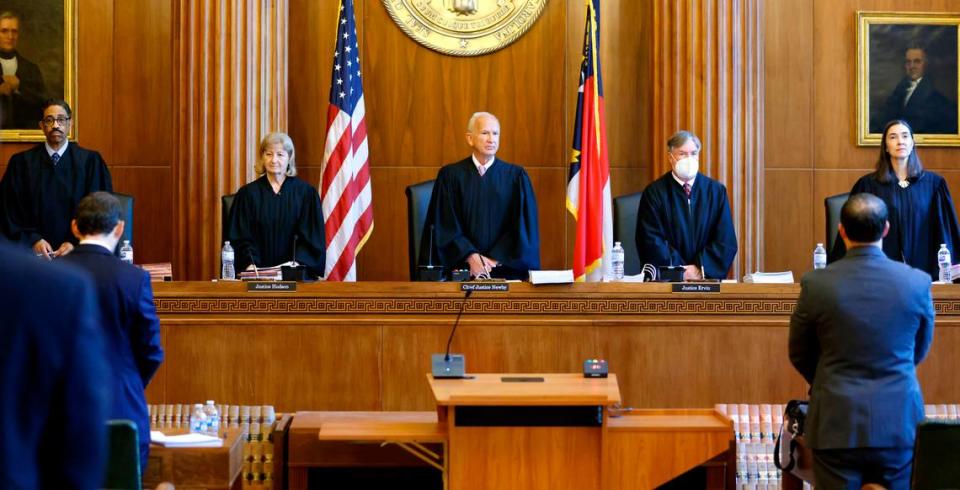NC Supreme Court agrees to GOP lawmakers’ request to rehear Leandro school lawsuit
The North Carolina Supreme Court has granted the request of Republican legislative leaders to revisit whether the courts can order the state to pay hundreds of millions to public schools
In a court order dated Oct. 20, the Supreme Court agreed to hear the appeal filed by Sen. Phil Berger and House Speaker Tim Moore that a trial judge lacked the jurisdiction to say the state owes schools $677.8 million.
In its majority decision, Republican Associate Judge Phil Berger Jr. — the son of Sen. Berger — said many matters remain unresolved in the long-running Leandro school funding case. Among them, he wrote, is whether the prior order should apply to the whole state or just the five school districts that started the lawsuit.
“If public school students or local school boards who are not parties to this case believe the remedial order does not sufficiently address the educational failure in their districts, are they bound by the remedial order?” Berger Jr. wrote. “If so, how were their rights adjudicated without their presence in the suit — an elementary principle of jurisdictional law.”
Democratic judges dissent over hearing appeal
Just days before the November 2022 midterm elections, the then-Democrat-controlled Supreme Court issued a decision backing a trial judge’s order requiring the state to transfer the money. But Republicans won two seats in last year’s elections to gain a 5-2 majority on the high court.
In March, the court’s new GOP majority reinstated an order from a panel of appeals court judges saying that the trial judge had exceeded his authority when he ordered the money transfer.
In her Oct. 20 dissent, Democratic Associate Justice Anita Earls accused the majority of allowing GOP lawmakers to relitigate last year’s decision.
“Make no mistake: By granting the Legislative-Intervenors’ petition, the majority agrees to revisit Leandro IV and ignore what we said just 11 months ago,” Earls wrote. “By doing so, it tells ‘the public that our decisions are fleeting.’ Across every meaningful metric, we have already resolved this dispute.”
No court date has been set to hear the appeal.

Nearly 30 years of litigation
The Leandro school funding lawsuit was initially filed in 1994 by low-wealth school districts to get more state funding.
Over the years, the state Supreme Court has ruled that the state constitution guarantees every child “an opportunity to receive a sound basic education” and that the state was failing to meet that obligation.
In November 2021, Superior Court Judge David Lee ordered the state treasurer, controller and budget director to transfer $1.75 billion to fund the next two years of a plan developed by a consultant. The plan is meant to try to provide every student with high-quality teachers and principals.
During the case, the leaders of the Republican-led General Assembly have argued that only lawmakers and not the courts have the state constitutional authority to spend state funds. GOP leaders have also argued that any court decision should be confined to Hoke County or the original plaintiffs.
Lee has since passed away. In April, Superior Court Judge James Ammons issued an updated court order saying $677.8 million is still owed.
GOP lawmakers appeal judge’s order
In September, Berger and Moore appealed Ammons’ authority to issue his order. The court’s 5-2 GOP majority granted the legislators’ request to hear the appeal.
Berger Jr., who was part of last year’s dissent, accused the former Democratic majority of rushing to reach a decision last November without addressing many issues..
“In sum, the Legislative-Intervenors argued various jurisdictional theories in their briefs and arguments to this Court that were left unresolved,” Berger Jr. wrote. “This court is dutybound to address any potential subject matter jurisdiction issues, even those that are not raised by the parties.”
But Earls says the majority did resolve the jurisdiction issue last year.
“Beyond question, public education is an important issue that sparks strong beliefs,” Earls wrote. “And when this Court rapidly reverses course on that topic, it ‘calls into question its commitment to legal principle.’ It signals to North Carolinians ‘that their constitutional protections h[a]ng by a thread” — that ‘a new majority’ can ‘by dint of numbers alone expunge their rights.’”

